
RoboCup is an annual international robotics competition founded in 1996 by a group of university professors. The aim of the competition is to promote robotics and AI research by offering a publicly appealing – but formidable – challenge.

A CubeSat is a class of small satellite with a form factor of 10 cm (3.9 in) cubes. CubeSats have a mass of no more than 2 kg (4.4 lb) per unit, and often use commercial off-the-shelf (COTS) components for their electronics and structure. CubeSats are deployed into orbit from the International Space Station, or launched as secondary payloads on a launch vehicle. As of December 2023, more than 2,300 CubeSats have been launched.
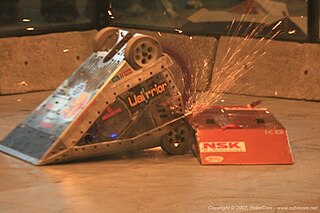
Robot combat is a type of robot competition in which custom-built machines fight using various methods to incapacitate each other. The machines have generally been remote-controlled vehicles rather than autonomous robots.
RoboCup Junior (RCJ), sometimes stylised RobocupJunior, is a division of RoboCup, a not-for-profit robotics organisation. It focuses on education and aims to introduce the larger goals of the RoboCup project to primary and secondary school aged children. Participants compete in one of three main leagues: Soccer, Rescue or Dance. Dance Theatre also exists as a sub-league of Dance, and Premier Rescue is part of the competition in Australia and New Zealand.

A robot competition is an event where the abilities and characteristics of robots may be tested and assessed. Usually they have to outperform other robots in order to win the competition. Many competitions are for schools but several competitions with professional and hobbyist participants also exist.
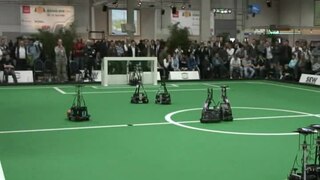
Robot football is a sport organised by the Federation of International Robot-soccer Association. It aims to create a team of robots capable of beating a human side at football by 2050.
The Federation of International Robot-soccer Association [sic] (FIRA) is an international organisation organising competitive soccer – usually 5-a-side – competitions between autonomous robots.

As one of the founding leagues of the international RoboCup initiative, the RoboCup Middle Size League (MSL) robot soccer competition has been organised from 1997 onwards. On an indoor soccer field, with goals of reduced size, teams of five fully autonomous soccer playing robots compete against one another. No human intervention is allowed during a match, except to take robots on or from the field. Although limitations with respect to maximum size and weight are in place, teams are completely free to design both hardware and software.
Robo-One is a robot competition category of bipedal humanoid robots. The first ROBO-ONE contest was held in Japan on February 2, 2002, and consisted of an initial judged autonomous "Demonstration" stage, followed by one-on-one matches. In Japan, ROBO-ONE has spawned a whole series of related competitions including ROBO-ONE J, ROBO-ONE Special, ROBO-ONE Grand Prix, and the ROBO-ONE Technical Conference events. ROBO-ONE type contests have been held in several other countries including South Korea (official) and the United States.
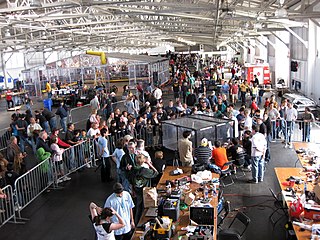
RoboGames is an annual robot contest held in San Mateo, California. The last RoboGames was held April 6-9, 2023 in Pleasanton, California, having been on hiatus since the previous event in April 2018.

Robofest is an autonomous robotics competition for 4th - 12th graders. It is similar to FIRST Lego League (FLL), but while FLL limits the student's robots to Lego Mindstorms robots, Robofest allows the student to use any robotics system, parts, materials, or even custom electronics, in some of the events. Note that FLL students are required to use parts manufactured by Lego only, preventing the use of such aids as string or glue. Another important difference is that Robofest games have UTF components. Students must solve the unveiled tasks and factors within 30 minutes work-time without external help. Lawrence Tech's Robofest was founded by Computer Science Professor Dr. Chan-Jin Chung in 1999–2000 academic year and is sponsored by Lawrence Technological University and other sponsors. LTU's Robofest is also held internationally, in countries including Brazil, Canada, China, Colombia, Ecuador, Egypt, Ethiopia, England, France, Ghana, Greece, Hong Kong, Hungary, India, Kenya, Lebanon, Macau, Malawi, Mexico, Morocco, Nigeria, Philippines, Saudi Arabia, Singapore, South Africa, South Korea, Taiwan, Jordan, and UAE. Teams who win their regional event are welcome to participate at the worldwide tournament held at Lawrence Technological University in Michigan. ROBOFEST is a registered trademark of Lawrence Technological University. Robofest is one of the largest University led robotics competitions in the world for pre college students.
There are a number of competitions and prizes to promote research in artificial intelligence.
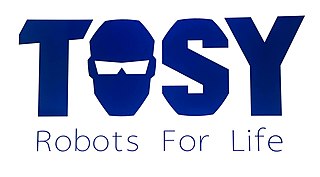
TOSY Robotics specializes in designing and manufacturing robots and smart toys. The most famous products from TOSY Robotics are TOPIO Robot, DiscoRobo, TOOP and AFO.
The World Robot Olympiad (WRO) is a global robotics competition for young people. The World Robot Olympiad competition uses Lego Mindstorms manufactured by LEGO Education. First held in 2004 in Singapore, it now attracts more than 28,000 teams from more than 85 countries.

The RoboCup Rescue Robot League is an international competition for urban search and rescue robots, in which robots compete to find victims in a simulated earthquake environment. The rescue robot league is run alongside Robocup Rescue Simulation, as part of the RoboCup robot competition.

Student Robotics is a registered charity that runs an annual robotics competition for teams of 16 to 19 year-olds. The charity aims to foster a world where engineering and artificial intelligence is accessible to young people with a stated mission "to bring the excitement of engineering and the challenge of coding to young people through robotics". The competition is free to enter and teams are provided with all of the core electronics that they need to build a robot. To encourage creative and ingenious solutions to problems, constraints on design are kept to a minimum, and the students can build and fashion their robots with any materials they choose; this results in a wide range of quirky, original robots. The robots must operate autonomously; once they are switched on to compete no interference from the team is allowed.
Istanbul Technical University Robot Olympics (ITURO) is a robotic organization consisting competitions, seminars, colloquies, panel discussions, exhibitions and workshops that has been hosted by Istanbul Technical University Control and Automation Student Society since 2007. The three-day organization ITURO is organized at ITU Suleyman Demirel Cultural Center in Ayazağa Campus in every spring. In 2015, there were ten categories and the categories are being updated every year. Also, by the participation of experienced academics and industrial representatives, topics related to robotics and technology become discussed in both national and international manner.
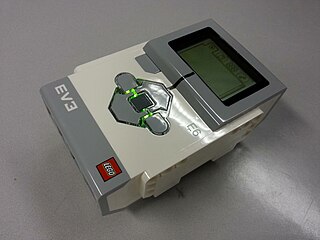
LEGO Mindstorms EV3 is the third generation robotics kit in LEGO's Mindstorms line. It is the successor to the second generation LEGO Mindstorms NXT kit. The "EV" designation refers to the "evolution" of the Mindstorms product line. "3" refers to the fact that it is the third generation of computer modules - first was the RCX and the second is the NXT. It was officially announced on January 4, 2013, and was released in stores on September 1, 2013. The education edition was released on August 1, 2013. There are many competitions using this set, including the FIRST LEGO League Challenge and the World Robot Olympiad, sponsored by LEGO.
VEX Robotics is a robotics program for elementary through university students and a subset of Innovation First International. The VEX Robotics competitions and programs are managed by the Robotics Education & Competition Foundation (RECF). In April 2018, VEX Robotics Competition was named the largest robotics competition in the world by Guinness World Records.

RoboMaster is an annual intercollegiate robot competition held in Shenzhen, Guangdong, China. First started in 2015, it is the brainchild of DJI's founder and CEO Frank Wang, and jointly sponsored by the Communist Youth League Central Committee, the All-China Students' Federation (ACSF) and the Shenzhen City Government. It is the first shooting sport-style robotics competition in China.














